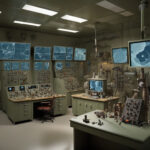Controlling Cell Death: A Key to Space Survival and Slower Aging
A form of cell death long dismissed as biological debris may in fact be the key to unlocking human survival in space and potentially slowing down the aging process, according to a recent study. The research suggests that by controlling this type of cell death, scientists could pave the way for extended space missions and even explore the possibility of age-defying treatments here on Earth.
The study, conducted by a team of researchers at the forefront of biotechnology and space exploration, sheds light on the intricate mechanisms of cell death known as necrosis. Previously considered a chaotic and unregulated process leading to cell destruction, necrosis has been reevaluated as a potential target for intervention to enhance human resilience in extreme environments.
In the harsh conditions of space, where radiation exposure, microgravity, and other stressors pose significant challenges to the human body, the ability to modulate necrosis could offer a groundbreaking solution. By preventing or regulating necrotic cell death, astronauts could better withstand the rigors of long-duration space travel, mitigate the harmful effects of cosmic radiation, and potentially extend their time beyond Earth’s protective atmosphere.
Moreover, the implications of controlling necrosis extend far beyond space exploration. The study suggests that by fine-tuning this process, researchers could develop innovative strategies to slow down aging and age-related diseases on Earth. As necrosis plays a role in various health conditions, including neurodegenerative disorders, cardiovascular diseases, and cancer, mastering its regulation could open new possibilities for enhancing human longevity and well-being.
One potential application of this research lies in the field of regenerative medicine, where the ability to manipulate cell death pathways could facilitate tissue repair and regeneration. By harnessing the power of controlled necrosis, scientists may unlock novel therapies for healing injuries, treating degenerative conditions, and rejuvenating aging organs.
Furthermore, the study underscores the interconnectedness of space science and biomedical research, highlighting how discoveries made in the extraterrestrial realm can have profound implications for life on Earth. By leveraging insights from space exploration to advance healthcare technologies, scientists are pushing the boundaries of human potential and reshaping our understanding of aging, disease, and resilience.
As we look to the future of space travel and biomedicine, the study on controlling cell death stands as a testament to the transformative power of interdisciplinary collaboration and scientific innovation. By harnessing the forces of necrosis, researchers are not only charting a course for human survival in space but also paving the way for a healthier, more resilient future here on Earth.
In conclusion, the study’s findings offer a glimpse into a promising frontier where the mastery of cell death could hold the key to unlocking the secrets of space travel and longevity. By recognizing the potential of necrosis as a strategic target for intervention, scientists are poised to revolutionize our approach to health, aging, and exploration. As we venture further into the cosmos and delve deeper into the mysteries of life, controlling cell death may prove to be the ultimate tool for shaping a brighter, more resilient future for humanity.
space, survival, aging, biomedical research, innovation












